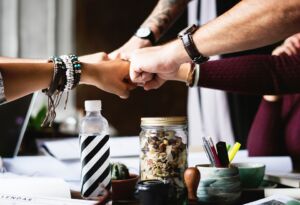
Social Skills
Reflection task 11
• What social skills do I possess?
• Can I assert myself and communicate my desires to others? Dare I say NO?
• Can I forgive? Can I apologize when needed?
Being social differs from having social skills
Being social is often connected with someone being fluent in public speaking, talkative, well-liked, talented, and successful. In truth, being social is an innate personality trait which means the will and interest in being around other people. A social person actively seeks company and wants to be around people.
Being social has nothing to do with someone being well-liked, successful, or skilled though. Our temperament could be social, but we still might lack important social skills. Being social as an innate temperament trait tells nothing about how well we complete our tasks or how talented we are. It’s good to tell apart being social as an innate temperament trait from social skills which anyone can practice. Social skills basically mean the ability to interact with others. When we meet new people and start having discussions with them, we use social skills. Making friends and keeping up friendships, working in a group, and good communication also require social skills.
Because having social skills is not innate, there’s a good possibility to improve them throughout our lives. Social skills mainly develop through:
- Social learning and life experiences
- Parental, teacher and close adult teaching and guidance.
- Receiving feedback.
It’s never too late to learn or develop social skills. Different interactions give us the possibility to practice and test out these skills. Keep in mind that they often improve slowly.

All kinds of social skills
Social skills are in use in both familiar and less familiar interactions and the decisions we make when solving conflicts. When you have reciprocal negotiations, can compromise and have respect for yourself and others, you have important social skills. This means there’s no need to use force or dominate others.
A socially skilled person has a wide variety of tools to use in different situations and needs. These tools are varied social skills learnt during the years. There are basic skills which are vital in several interactions with others.
Basic skills
- introducing yourself and others
- listening
- starting a discussion and conversational skills
- asking and getting advice
- having an informal chat
- giving and receiving compliments
- asking for help
You should put effort into these basic skills. When you master them, it’s easier for you to improve your advanced skills.
Advanced skills
- joining a group and teamwork
- giving instructions
- following lessons
- apologising
- influencing people and being assertive
- making friends and cooperative skills
The basic and advanced skills are good basic tools for various interactions. In addition, there are several other vital skills. For instance, emotional social skills are significant in interacting with people. Without understanding your own or other people’s emotions there would be no room for empathy, sharing experiences or connecting on a deeper lever.
Emotional social skills
- recognising and naming your emotions
- empathy, which means the ability to sympathize with somebody, understand their emotions and their meaning
- showing affection
- expressing all emotions, also the difficult ones
- facing and processing the feelings of others, also the difficult ones
Social skills form a wide skill set which consist of numerous other useful skills in addition to these. For example, skills like losing, sharing with others, helping others, negotiation skills, dealing with blame and injustice and showing interest are also important everyday skills.

Practice your social skills
Remember that you can always practice and improve your social skills. Paying attention to your own behaviour in social situations helps you improve your conversational and listening skills. You might take some social skills for granted and they might seem irrelevant. But these small things might determine the outcome or resolution of a situation.
Things to consider
- Do I remember to introduce myself to new people?
- Do I reply when someone greets me or asks a question?
- Do I listen to others during a conversation and do I let them speak?
- Do I look people in the eye when I’m talking to them?
- Do I listen actively to the person I am talking to by gesturing, facial expressions and replies?
- Do I express my opinions in a conversation?
- Do I use “I” statements when I draw lines?
- Do I remember to say thank you, I’m sorry and please?
Sometimes it’s a good idea to think what kind of impression you give to others. Your face, body, look, speech, conversational skills, and attitude affect the first impressions made by people. A good way to practice social skills is to imitate someone whose style you like. How do they enter a room? What do they say? How do they react to you? You can also practice with your family or friends either by having discussions or actually practicing specific interactions.
It’s also important to notice how your mood affects our interaction with others. When we’re feeling down, we behave differently. You might feel like others are avoiding you or being impolite even if that is not the case. Your interpretation affects how you interact with others anyway. Your behaviour might show others that you are not interested or would rather be left alone. Then others will stay away and there’s next to none interaction even if that is not something you wished to happen.
Sometimes it’s good to remember that people’s reaction to us has often nothing to do with us. The person might have worries and problems which cause them to act rude and uninterested.
Keep these in mind too
Don’t feel bad if you are rejected, it might not have anything to do with you. Avoid negative thinking like:
- I’m worse than others.
- No one is interested in me.
- No one cares about me.
Try to think more positive:
- I’m as good as others.
- Someone is interested in me surely.
- People care about me.
My Social Skills
Being assertive promotes wellbeing
Being assertive is a very important social skill. Without it we are subjected to other people. We have the responsibility to be assertive and draw our own lines. I am responsible for what happens to me or what I agree to in relationships and interaction with others. If you have a hard time holding on to your rights, it’s good to find out why. Are you being too nice?
It can seem like a good idea to be nice, but it’s unhealthy to always go along with others’ views. If being nice means constantly agreeing with something you actually dislike, you are making your life hard and finally might burn out. Being too nice can be based on the fear of no longer being liked if you disagree or express your own wishes. If in your childhood you had to please everybody, you might be prone to it as an adult and feel the strain. In some situations, being nice might have felt like the only way to survive.
Being assertive means the ability to express your thoughts, feelings, needs, wishes and views directly and sincerely even when they differ from others’. When we are assertive, we stand our own ground without infringing on anybody’s rights. Assertiveness is based on the thought that both you and I have rights and they are equal. Assertiveness is the ability to say “no” and draw lines to both yourself and others. This means that nobody abuses or walks over you.
Practicing assertiveness can help with relationships so that others listen and respect you more. You shouldn’t always be flexible or please others. This drawing your own lines can be seen as healthy selfishness which is about negotiating and drawing lines between the needs of you and others. It’s good to practice and work with assertiveness.
Find situations in your life where practicing assertiveness might come in handy. Think about how to prepare for these. What do you reply when a study buddy asks you for a favour you don’t want to do? How do you turn down an invitation to a party on Saturday night when you need time for yourself? How to be assertive and polite and say no on the phone when your friend is prepared to complain about their broken heart for 3 hours?
Everyday life is often a balance between the yes and the no. You must consider what is important right now, how I want to spend my time and energy and how I can rewind. You need to find a balance between your wishes and needs and the other things.

Assertiveness
Forgiving and asking for forgiveness are valuable skills
”I’m sorry” is a small but important expression. Asking for forgiveness and forgiving are important social skills that are significant for our wellbeing. It’s a different thing to say you’re sorry in an everyday setup when you bump into someone than ask for forgiveness when someone feels mistreated. The latter situations are the ones which might haunt us and cause bitterness, hatred, or disappointment. Forgiveness is often needed in situations where someone has been ostracized or bullied, mistreated by their closest people, harmed or has felt injustice in general. When you’re living it up, someone will get hurt either less, more, intended or unintended, it’s unavoidable.
The more difficult or hurtful the matter, the harder it is to forgive. Everyone should aim at forgiving though. It releases you from anger and bitterness to joy and harmonious life. It’s important to keep in mind that forgiving doesn’t mean approving the wrongdoing but facing the fact that we’re all incomplete.
Forgiving is not
- approving of what happened
- defending what happened
- entitling what happened
- a forced reconciliation between the parties
- dismissing what happened
- being blind to what happened
- forgetting
- refusing to take the wrongdoing seriously
- pretending not to be hurt
Before the wronged person can forgive, they need to feel that their experiences and feelings have been heard. You can forgive someone even if they are not present. Sometimes it’s better for your process it so that the person in need of forgiving is not there. Then you can confide in your friends, or sometimes you might need professional help.
Forgiving means that
- I’m aware of the wrongdoing and still forgive.
- I decide not to ruminate over the wrongdoing.
- I decide and I want to leave what happened behind.
- I refuse to punish the other person.
- I refuse to gossip.
- I’ll be graceful and merciful.
- I’ll release myself from bitterness.
Forgiving makes you less angry, hurt, depressed, and stressed. Forgiving also brings you more hope, peace, compassion, and self-assurance. It improves relationships and physical health. The ability to forgive increases with age. Often it might be useful to forgive yourself. Here’s a method you could try: When you go to bed at night, say your name and “I forgive you”. Repeat three times. Do the same using the person’s name who has wronged you.
Asking for forgiveness
When a person asks for forgiveness, they wish to solve a situation which has hurt someone. It’s not always easy to ask for forgiveness. Sometimes it’s hard to find the right words, sometimes you don’t even notice you have hurt the other person. There can be feelings of shame and fear. You’ll have to face not being perfect. Saying I’m sorry doesn’t mean the past is forgotten, but it’s a step that the wrongdoer can take. Asking for forgiveness means taking responsibility for your own mistakes. Seeing and admitting your own imperfection is the key to personal growth. If you never admit you’ve wronged someone and feel there’s no need to say I’m sorry, you don’t get a chance to grow.
